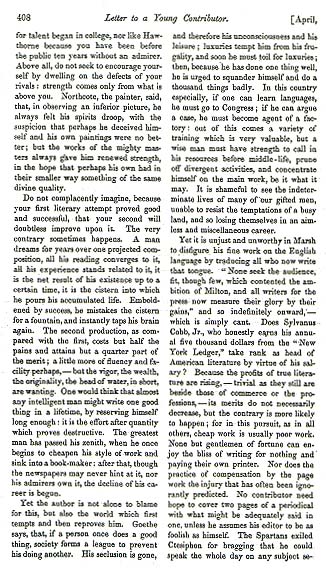Manuscript:

Transcription:
for talent began in college, nor like Hawthorne because you have
been before the public ten years without an admirer. Above all, do
not seek to encourage yourself by dwelling on the defects of your
rivals: strength comes only from what is above you. Northcote, the
painter, said, that, in observing an inferior picture, he always felt his
spirits droop, with the suspicion that perhaps he deceived himself
and his own paintings were no better; but the works of the mighty
masters always gave him renewed strength, in the hope that
perhaps his own had in their smaller way something of the same
divine equality.
Do not complacently imagine, because your first literary attempt
proved good and successful, that your second will doubtless
improve upon it. The very contrary sometimes happens. A man
dreams for years over one projected composition, all his reading
converges to it, all his experience stands related to it, it is the
net result of his existence up to a certain time, it is the cistern
into which he pours his accumulated life. Emboldened by
success, he mistakes the cistern for a foundation, and instantly
taps his brain again. The second production, as compared with
the first, costs but half the pains and attains but a quarter part of
the merit; a little more of fluency and facility perhaps,--but the
vigor, the wealth, the originality, the head of water, in short, are
wanting. One would think that almost any intelligent man might
write one good thing in a lifetime, by reserving himself long
enough: it is the effort after quantity which proves destructive.
The greatest man has passed his zenith, when he once begins
to cheapen his style of work and sink into a book-maker: after
that, though the newspapers may never hint at it, nor his
admirers own it, the decline of his career is begun.
Yet the author is not alone to blame for this, but also the world
which first tempts and then reproves him. Goethe says, that,
if a person once does a good thing, society forms a league to
prevent his doing another. His seclusion is gone, and therefore
his unconsciousness and his leisure; luxuries tempt him from
his frugality, and soon he must toil for luxuries; then, because
he has done one thing well, he is urged to squander himself
and do a thousand things badly. In this country especially, if one
can learn languages, he must go to Congress; if he can argue a
case, he must become agent of a factory: out of this comes a
variety of training which is very valuable, but a wise man must
have strength to call in his resources before middle-life, prune
off divergent activities, and concentrate himself on the main work,
be it what it may. It is shameful to see the indeterminate lives of
many of our gifted men, unable to resist the temptations of a busy
land, and so losing themselves in an aimless and miscellaneous
career.
Yet it is unjust and unworthy in Marsh to disfigure his fine work
on the English language by traducing all who now write that tongue.
"None seek the audience, fit, though few, which contented the
ambition of Milton, and all writers for the press now measure their
glory by their gains," and so indefinitely onward,--which is simply
cant. Does Sylvanus Cobb, Jr., who honestly earns his annual five
thousand dollars from the "New York Ledger," take rank as head
of American literature by virtue of his salary? Because the profits
of true literature are rising,--trivial as they still are beside those of
commerce or the professions,--its merits do not necessarily
decrease, but the contrary is more likely to happen; for in this
pursuit, as in all others, cheap work is usually poor work. None but
gentlemen of fortune can enjoy the bliss of writing for nothing and
paying their own printer. Nor does the practice of compensation
by the page work in the injury that has often been ignorantly
predicted. No contributor need hope to cover two pages of a
periodical with what might be adequately said in one, unless
he assumes his editor to be as foolish as himself. The Spartans
exiled Ctesiphon for bragging that he could speak the whole
day on any subject se-



